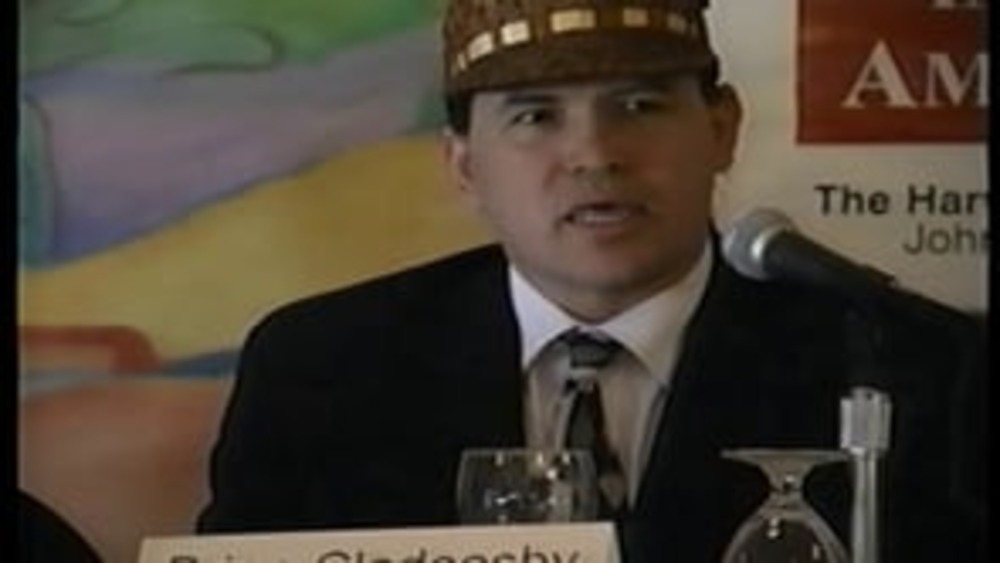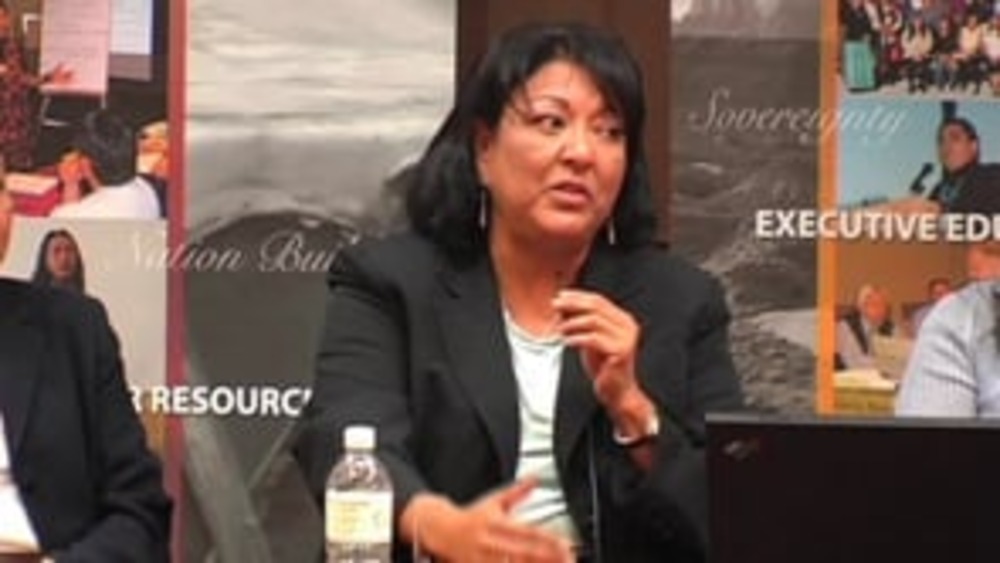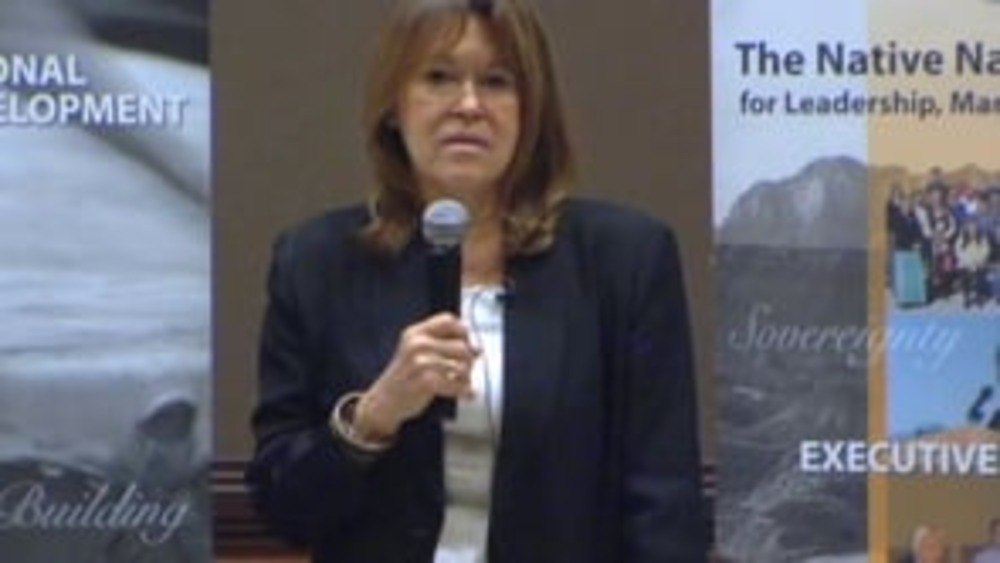Oklahoma Indian Gaming Association Executive Director Sheila Morago share some keys to effective lobbying --including being mindful of time, the issues, and audience -- and argues that Native nation leaders are their nations' own best advocates.
Additional Information
Morago, Sheila. "Keys to Effective Lobbying." Emerging Leaders Seminar. Native Nations Institute for Leadership, Management, and Policy, University of Arizona. Tucson, Arizona. March 26, 2008. Presentation.
Transcript
"Okay, one of the things I like to do when I first start is to tell everybody a little story. So I'm going to tell you a story about my first lobbying experience in Washington, D.C. I had been hired by my tribe -- and for those of you who know me, you will like really laugh at this 'cause it's so me -- I was hired by my tribe to do public relations and marketing for our casino. Every year the Arizona tribes to the Inter Tribal Council of Arizona [ITCA] take the tribal leaders and all their representatives and councils, whoever wants to go, up to lobby our issues in DC; we call that 'Impact Week.' Well, they invited me to go. I was very excited. And you get there and there's these halls and they're beautiful and boy, god, very intimating. And I'm there with all these tribal council members, our lieutenant governor, all these tribal governors and chair people from all our tribes in Arizona, and they're going, we're in [Congressman] J.D. [Hayworth]'s office. And we're going around the room and everybody's going, 'Good morning, my name is so-and-so from this particular tribe.' So in my head -- I'm towards the end -- and in my head I'm going, 'Okay, Sheila Morago, Gila River Casino, Sheila Morago, Gila River Casino,' [because] I'm very nervous. And he gets to me and he looks at me and I go, 'Hi, I'm Sheila River.' Sheila River? Missed the Morago, Gila River, everything; just 'Sheila River.' So there is a first time for everything and if you can do better than that, you are a thousand miles ahead of me. So let's get going. What I've learned a lot from doing my job so let's get started. Oh, my goodness. They're going to make me go through this whole thing.
Okay. There's actually just three really key things to effective lobbying. Know your audience, know your message, and use your time effectively. So who's you're audience? You have to know who you're meeting with and who you're talking to. Are they a member of your congressional delegation? Are they from your state? Are they on a specific committee? Are they not from your state but on a committee that has an influence regarding an issue that is important to you? So for all of us, it's Senate Committee on Indian Affairs, any of the 'approps' [appropriations] committees, resources committee on the House [of Representatives] side; those are the ones that usually take the bulk of all the Indian work. What is the rank of the importance of the person you're meeting with? Now, are they the congressional member, the senator or the congressman, senior staff, staff director, legislative director, or are they a junior staff member? All of these people have different levels of knowledge of what it is you're going to be talking to them about. And as a leader, as a tribal leader in the government-to-government nature, you should be meeting with the congressional member. If it's a junior staff member, I'd hope you send your staff. Depending on who your audience is you may deliver your message differently.
Your congressional delegate -- talk about home a little bit. They know who you are. They're from your state. Thank them for any of the past help they have given you. You've got people who've been there a very long time and chances are they have definitely helped in one little way even if it's a little tiny thing. We've got a couple of Congress people from Arizona that you have to kind of look really hard to find something good that they've done for Indian people but you can find something, really, even if they didn't do it for you, they did it for somebody else. And bring up the issue at hand whether it's your water settlement, whether or not we're talking about gaming particularly, whether it's homeland security, particular issues based on your particular tribe. And be specific about what it is you're asking, because the worst thing is that they leave, you leave and then they go, 'I have no clue what I'm supposed to do.' And this is also a good time to mention to them about particular staff members that have been helpful in any of your issues in talking to them or, by some stretch, people who have not been helpful to you. Because these are members of your congressional delegation and they're going to need to know if there's a staff person there that has not been accommodating or helpful to you.
Key committee member -- you're going to want to explain to them who you are. These are people from other parts of the country. They may not know that you are from Arizona or California or Oklahoma. And have the issue at hand [that] directly impacts your tribes. These are usually very big national issues. Right now the Indian Health Care Improvement Act, passing that. NAHASDA [Native American Housing Assistance and Self Determination Act of 1996], BIA [Bureau of Indian Affairs] funding, detention centers, law enforcement -- these are very big issues that are done on a national level, usually through NCAI [the National Congress of American Indians], and they need to know exactly how that's going to impact your tribe directly. Provide relevant background information. Strange as it may seem, telling a story is good, but a lot of times they want detail. They want numbers. They want percentages. So you have to give it to them, but you can keep that part very short and very specific and you can actually hand them a piece of paper on that. You don't actually have to spend lots and lots of time doing that. Offer, if you must -- if it's something that really, really impacts you and you have a lot of information on that -- offer to be the source of any future information they may need. One of the things that you find is that they may be in charge of that particular issue, but they might not know everything. And if there's something very good or bad about what's going to happen because of this legislation to your tribe, then you want to be very involved in it.
Senior staff person -- this is a legislative director, any senior staff directors. It is likely they know a lot about what it is you're coming to talk to them about. They've probably been working this issue for a very long time. So you don't have to spend a whole lot of time educating them on this stuff. Make sure you tell how -- personalize the issue. Tell them how, again how it affects your particular tribe and a story, whether it's good or bad. And you should give them your handouts and again, these are people who don't have a whole lot of time, so be brief. I think that the actual time limit if you're meeting with a Senator or congressional staff member it's probably about 15 minutes you're going to get with them, that's about it. Senior staff person maybe 20, 30 if you're lucky, but you only have a little bit of time. Be mindful of time. I forgot that part on the last one.
Junior staff people -- these are new people. These are brand new guys that they send out there and they just say, 'I can't make this meeting, you go.' They're probably not real familiar with what it is you're talking about. I'll give you an example. We had a new congressional representative out of Arizona and we went to go meet with her. It was her first time, Gabrielle Giffords, from this area of Arizona. New staff director [because] she's just getting all her new people, her staff in. This guy was from California had no clue; not how many Arizona tribes there were, anything. You need to give them as much background information as you can, get them up to speed. And that guy will sit with you, or girl will sit with you, for the longest period of time because they're just like little sponges. They're new too, they want to know. Give them reading material, background information and give them as much as you can and stay with them. As long as they're asking questions, answer them. [Because] they have a lot of time and they need to get up to speed and they know it.
Know your message. Be very clear about the issue and what it is you're asking for. That may sound very basic, but let's say that there's a particular national issue that everybody's working on. And in Indian Country, it's very hard to get consensus on any one issue, so once you have consensus stay on that message, [because] that is one thing that everybody is pushing, pushing, pushing, pushing, pushing in a collective way to get this stuff done. So being off message on anything that is that big very much hurts your issue.
Keep it simple. You have 15 minutes with this person. This person who has a right to vote up or down and in any, especially right now, these votes are very close a lot of times, so you want to keep it simple. And ask them specifically, 'We want you to vote yes,' or, 'we want you to vote no.'
Be mindful of time. Always be on time for your appointments, because if you miss it -- if you're like five minutes late, or if we do Indian time. We're good at that. We are very good at going, 'Ah, well, I'll get there sooner or later' -- you'll miss your appointment. They won't be there and you've lost your opportunity. Prior to the meeting, know the amount of time you're going to be allotted and if it's really short, get your most important issues out of the way first. I've been to a lot of meetings where you go through and you've missed the most important part because you want to tell everybody everything. And use your time wisely. When you're making your appointment, they're usually going to tell you, 'The Senator has about 15 minutes,' or 'You know what, he wants to really see you, he has a little bit of time so we've allotted about 30 minutes for him to spend with you.' That means you can hang out with him and talk to him and catch up on old times, which for a lot of us if we're older and have been around a while, we have spent a lot of time with these people. So you want to catch up on some stuff and if you have a lot of time you can do that. But if you have 15 minutes, you have to get right to the point and get to it quickly.
Trust yourself. You in this room as tribal members are your own best lobbyist. There is nobody you can hire in Washington, D.C. who knows the issue better than you do or can talk about it better than you do. And I know from all my buddies in D.C. that are lobbyists, that is going to like cost me a lot. I'm going to owe some people. Your lobbyists have been there a long time. They have made a lot of contacts with a lot of people. Use them to open the doors. Use them to make the contacts first, open the doors of who you need to meet with [because] sometimes calling a scheduler is just not the way, you're just not going to get the meeting with who you need to meet with, especially if they don't know you personally and get them to get the meeting in time. No one knows the issue impacts on your tribe better than you as a tribal member. You are not going to send a non-Indian to talk about cultural artifacts and how they need to be protected. Kind of doesn't sound the same coming out of them. You know this and you know the impact to your tribe better than anybody else. The issues you express to Congressional members have more impact when you do it person to person. And you may not realize it because they may not give you a lot of feedback right away, but this does make a huge impact on them.
That was it? Wow. I guess so. I thought I had a lot more than that on there. But anyway, one of the things I just want to impress -- and apparently I'm going to catch everybody up on time being very short -- but one thing I want to impress on you is it's always scary to do it the first time. Like I said with my story, if you can do better than that, you are like million light miles away from where I started. Practice makes perfect. Go, go, go again, go again, go again. Anytime you have an opportunity to have people listen to you is a good thing. Remember to talk about issues that are prevalent. One of the things that really messes everything up -- especially in someone's head -- is if you're talking about something that's already happened. So be mindful of the fact that there are things that have already been done or it is too late to lobby on. Appropriations: sometimes you can catch it at the beginning, you can catch it in the middle, but if it's already been sort of a done deal and they're working out the details, you pretty much missed the boat on that one. So everything that you do is going to take time, effort and practice. So if you can remember just to be mindful of time, know your issues and know who you're meeting with, you are going to be light years ahead of most people. Thanks."



